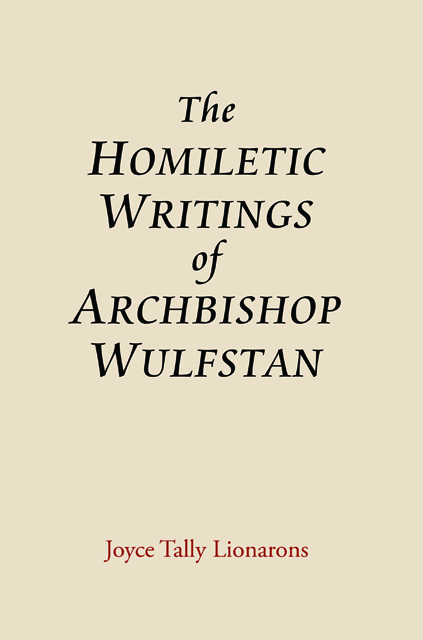Book contents
- Frontmatter
- Contents
- Acknowledgements
- Abbreviations
- Manuscript Sigla
- Introduction
- 1 Wulfstan and Wulfstan Manuscripts
- 2 Re-establishing the Wulfstanian Homiletic Canon
- 3 Wulfstan’s Eschatology
- 4 Salvation History and Christianity
- 5 Wulfstan as Archbishop
- 6 Sacramental Sermons
- 7 The Danish Invasions and the Sermo Lupi ad Anglos
- 8 Homilies Based on Legal Codes and the Institutes of Polity
- Bibliography
- Index
- Miscellaneous Endmatter
5 - Wulfstan as Archbishop
Published online by Cambridge University Press: 18 February 2023
- Frontmatter
- Contents
- Acknowledgements
- Abbreviations
- Manuscript Sigla
- Introduction
- 1 Wulfstan and Wulfstan Manuscripts
- 2 Re-establishing the Wulfstanian Homiletic Canon
- 3 Wulfstan’s Eschatology
- 4 Salvation History and Christianity
- 5 Wulfstan as Archbishop
- 6 Sacramental Sermons
- 7 The Danish Invasions and the Sermo Lupi ad Anglos
- 8 Homilies Based on Legal Codes and the Institutes of Polity
- Bibliography
- Index
- Miscellaneous Endmatter
Summary
AN ANGLO-SAXON ARCHBISHOP was responsible for supervising the priests and bishops of his sees, calling and presiding over ecclesiastical synods, administering church lands, attending meetings of the king's witan, and performing a wide range of liturgical functions, some of which were common to all priests or to other bishops, and some of which were reserved to the archbishop alone. The scope of an archbishop's liturgical functions can best be seen by looking at the various ordines found in Anglo-Saxon pontificals: these include directions for the ordination of priests, deacons, and others in lower orders; for the consecration of bishops, abbots, and abbesses, as well as churches, altars, relics, cemeteries, and chrism; for administering the sacraments of baptism and confirmation; for pontifical blessings at the time of communion; and for services to be performed on specific occasions (such as the visitation of the sick or the burial of the dead) or particular days (primarily Candlemas, Ash Wednesday, Maundy Thursday, and the Easter vigil). Although Wulfstan most likely owned and used more than one pontifical during the course of his thirty-year episcopal career, only one can be positively identified with him owing to the presence of corrections in the Wulfstan hand: the Claudius Pontifical I, extant in London, British Library, Cotton Claudius A.iii. As it stands, the manuscript is incomplete, with its quires no longer arranged in their original order; however, even in its original, unaltered form, many of the pontifical's texts seem to have been missing, severely abbreviated, or ‘already outdated when copied’. It is therefore extremely unlikely that Wulfstan ever used this manuscript as a practical service book. A better candidate is the Egbert Pontifical (Paris, Bibliothèque Nationale, lat. 10575), which Christopher Jones has suggested may have been owned by Wulfstan, largely on the basis of two texts otherwise extant in manuscripts associated with the archbishop: the Eclogae de ordine Romano and a rare ordo for a chrism mass extant in both W and (in truncated form) the Claudius Pontifical I.
Given the extent of an archbishop's liturgical duties, very few of Wulfstan's extant homilies stem from specifically liturgical occasions. Excluding the sermons on baptism and public penance examined in Chapter 6, there are only two: De dedicatione ecclesiae, for the consecration of a church, and Lectio secundum Lucam, for the consecration of a bishop.
- Type
- Chapter
- Information
- The Homiletic Writings of Archbishop WulfstanA Critical Study, pp. 108 - 122Publisher: Boydell & BrewerPrint publication year: 2010



